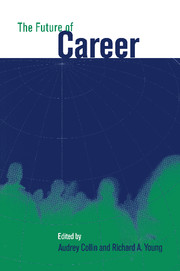Book contents
- Frontmatter
- Contents
- Notes on contributors
- Acknowledgements
- 1 Introduction: framing the future of career
- Part 1 Changing contexts
- Part 2 New perspectives
- Part 3 New directions for theory, practice and policy
- 12 Reconceptualising career theory and research: an action-theoretical perspective
- 13 A new perspective for counsellors: from career ideologies to empowerment through work and relationship practices
- 14 Adapting to the changing multicultural context of career
- 15 Managing careers in organisations
- 16 Learning for work: global causes, national standards, human relevance
- 17 The new career and public policy
- 18 The future of career
- Author index
- Subject index
12 - Reconceptualising career theory and research: an action-theoretical perspective
Published online by Cambridge University Press: 06 January 2010
- Frontmatter
- Contents
- Notes on contributors
- Acknowledgements
- 1 Introduction: framing the future of career
- Part 1 Changing contexts
- Part 2 New perspectives
- Part 3 New directions for theory, practice and policy
- 12 Reconceptualising career theory and research: an action-theoretical perspective
- 13 A new perspective for counsellors: from career ideologies to empowerment through work and relationship practices
- 14 Adapting to the changing multicultural context of career
- 15 Managing careers in organisations
- 16 Learning for work: global causes, national standards, human relevance
- 17 The new career and public policy
- 18 The future of career
- Author index
- Subject index
Summary
The thesis of this chapter is that career can be reconceptualised as an interpretative construct used by people and heuristic for counselling practice. This reconceptualisation is responsive to the current context in which both the viability of the construct of ‘career’ as well as ‘careers’ themselves have been challenged (e.g. Hall & Associates, 1996; Richardson, 1993). The reconceptualisation of career espoused here can be seen as representing one of several approaches Savickas (1995) identified as contributing to the reform of vocational psychology as an interpretative discipline (Carlsen, 1988; Cochran, 1990, 1991, 1992, 1997; Collin & Young, 1986, 1988; Csikszentmihalyi & Beattie, 1979; Neimeyer, 1988; Ochberg, 1988; Peavy, 1992; Savickas, 1993, 1994; Young, 1988). Many of these authors have attempted to address problems that have arisen in our traditional understanding of career from what can be understood as a postmodern perspective, although not all explicitly refer to their perspectives as such.
Before making a case in favour of the reconceptualised view, and thus supporting the viability of the career construct, it is pertinent to review briefly the issues that have contributed to the death of career as it has been largely understood (e.g. Hall & Associates, 1996), and then to identify the salient constructs and trends that have emerged in the discussion of career from an interpretative perspective. The reconceptualised view presented in this chapter addresses the issues relevant to the death of career, uses and extends constructs that have emerged in other interpretative approaches, and provides a conceptual framework to foster renewed research and practice in the career domain.
- Type
- Chapter
- Information
- The Future of Career , pp. 181 - 196Publisher: Cambridge University PressPrint publication year: 2000
- 44
- Cited by

